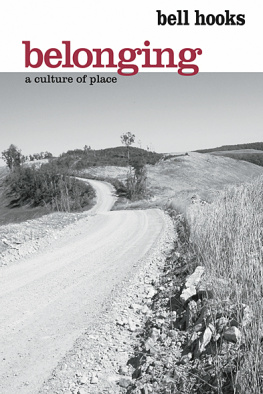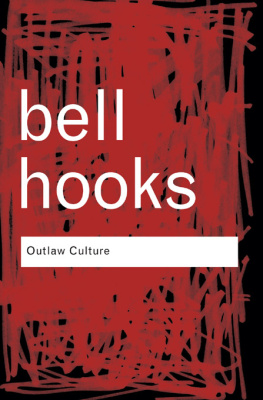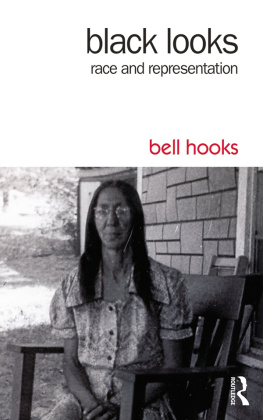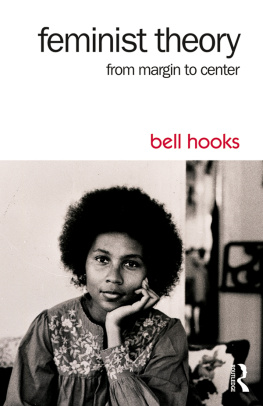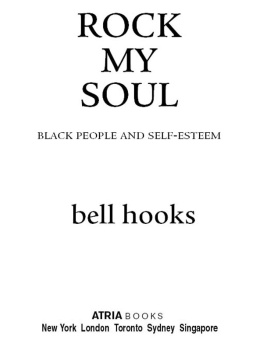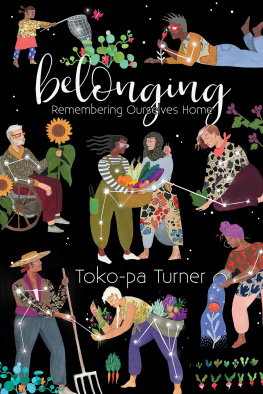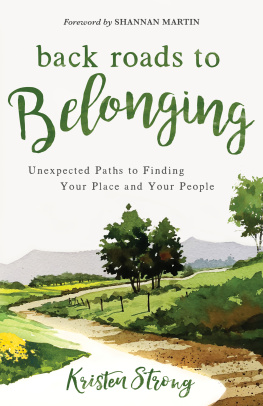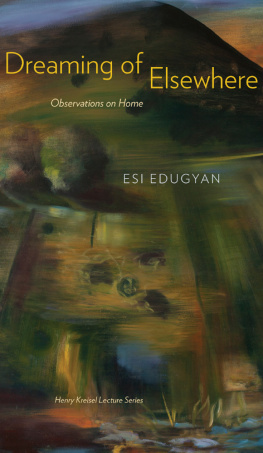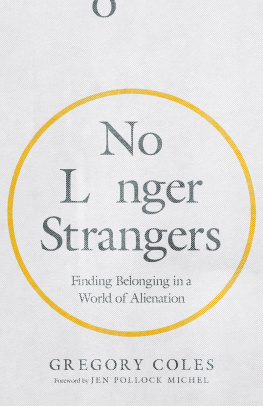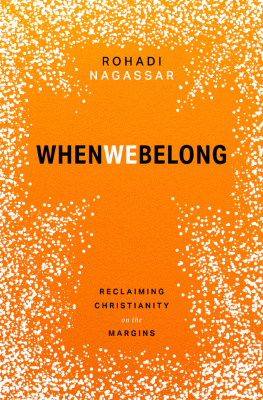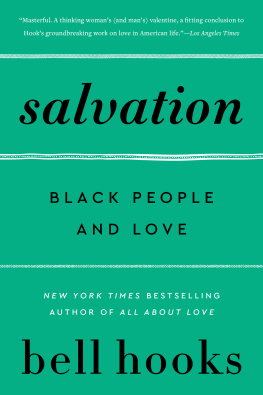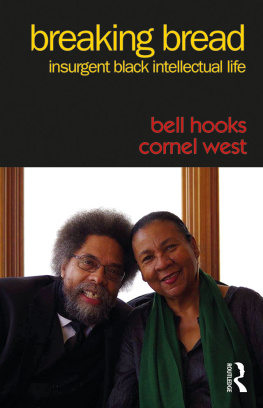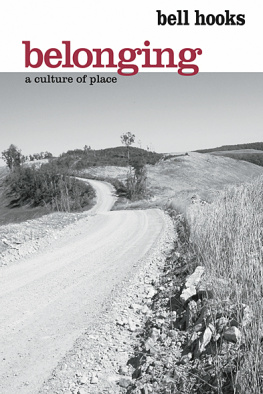Hooks - Belonging: A Culture of Place
Here you can read online Hooks - Belonging: A Culture of Place full text of the book (entire story) in english for free. Download pdf and epub, get meaning, cover and reviews about this ebook. City: Kentucky;New York;NY, year: 2009;2015, publisher: Taylor and Francis;Routledge, genre: Politics. Description of the work, (preface) as well as reviews are available. Best literature library LitArk.com created for fans of good reading and offers a wide selection of genres:
Romance novel
Science fiction
Adventure
Detective
Science
History
Home and family
Prose
Art
Politics
Computer
Non-fiction
Religion
Business
Children
Humor
Choose a favorite category and find really read worthwhile books. Enjoy immersion in the world of imagination, feel the emotions of the characters or learn something new for yourself, make an fascinating discovery.
Belonging: A Culture of Place: summary, description and annotation
We offer to read an annotation, description, summary or preface (depends on what the author of the book "Belonging: A Culture of Place" wrote himself). If you haven't found the necessary information about the book — write in the comments, we will try to find it.
Hooks: author's other books
Who wrote Belonging: A Culture of Place? Find out the surname, the name of the author of the book and a list of all author's works by series.
Belonging: A Culture of Place — read online for free the complete book (whole text) full work
Below is the text of the book, divided by pages. System saving the place of the last page read, allows you to conveniently read the book "Belonging: A Culture of Place" online for free, without having to search again every time where you left off. Put a bookmark, and you can go to the page where you finished reading at any time.
Font size:
Interval:
Bookmark:
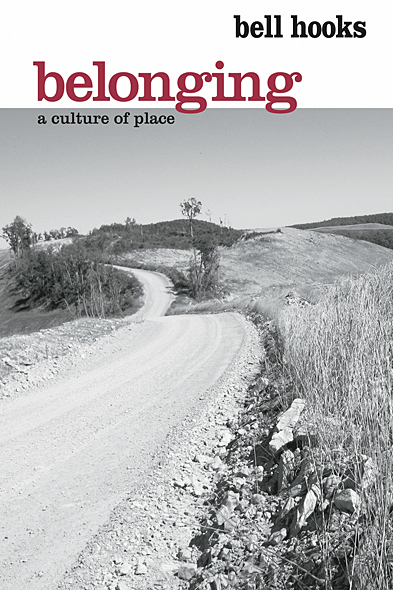
Belonging
Belonging:
A CULTURE OF PLACE
bell hooks

NEW YORK AND LONDON
First published 2009
by Routledge
270 Madison Ave, New York, NY 10016
Simultaneously published in the UK
by Routledge
2 Park Square, Milton Park, Abingdon, Oxon OX14 4RN
Routledge is an imprint of the Taylor & Francis Group, an informa business
This edition published in the Taylor & Francis e-Library, 2011.
To purchase your own copy of this or any of Taylor & Francis or Routledges collection of thousands of eBooks please go to www.eBookstore.tandf.co.uk.
2009 Taylor & Francis
All rights reserved. No part of this book may be reprinted or reproduced or utilised in any form or by any electronic, mechanical, or other means, now known or hereafter invented, including photocopying and recording, or in any information storage or retrieval system, without permission in writing from the publishers.
Trademark Notice: Product or corporate names may be trademarks or registered trademarks, and are used only for identification and explanation without intent to infringe.
Library of Congress Cataloging in Publication Data
hooks, bell.
Belonging : a culture of place / bell hooks.
p. cm.
Includes bibliographical references and index.
1. HomeSocial aspects. 2. HomeKentucky. 3. hooks, bell. 4. African American women KentuckyBiography. 5. African AmericansKentuckyBiography. 6. KentuckyBiography. I. Title.
HQ503.H76 2008
305.488960730769092dc22
[B]
2008021846
ISBN 0-203-88801-4 Master e-book ISBN
ISBN10: 0-415-96815-1 (hbk)
ISBN10: 0-415-96816-X (pbk)
ISBN10: 0-203-88801-4 (ebk)
ISBN13: 978-0-415-96815-7 (hbk)
ISBN13: 978-0-415-96816-4 (pbk)
ISBN13: 978-0-203-88801-8 (ebk)
To dancing in a circle of love to living in beloved community
I am grateful for everyone in Berea for welcoming me for giving me a place to belong
And I especially give thanks for Pete Carpenter, Paige Cordial, Timi Reedy, Jane Post, Vicky and Clarence Hayes, Bobby Craig, Eugene Powell, Susan King, Stephanie Browner, Linda, Alina, Libby, Peggy, Tammy, Mayor Steve Connelly, Vernon, Angela, and all my Kentucky family.
Preface |
Earthbound |
An Aesthetic of Blackness |
Aesthetic Inheritances |
Healing Talk |
Touching the Earth appeared first in Sisters of the Yam: Black Women and Self-Recovery (South End Press, 1993) 1993 by Gloria Watkins.
Representations of Whiteness in the Black Imagination appeared first in Black Looks: Race and Representation (South End Press, 1992) 1992 by Gloria Watkins.
Earthbound: On Solid Ground appeared first in The Colors of Nature: Culture, Identity, and the Natural World, edited by Alison Hawthorne Deming and Lauret E. Savoy (Milkweed Editions, 2002).
Aesthetic Inheritances: History Worked by Hand appeared first in Yearning: Race, Gender, and Cultural Politics (South End Press, 1990) 1990 by Gloria Watkins.
Inspired Eccentricity by bell hooks is from Family: American Writers Remember Their Own, by Sharon Sloan Fiffer and Steve Fiffer, 1996 Sharon Sloan Fiffer and Steve Fiffer. Used by permission of Pantheon Books, a division of Random House, Inc.
A Place Where the Soul Can Rest is reprinted by permission from Etiquette: Reflections on Contemporary Comportment edited by Ron Scapp and Brian Seitz, the State University of New York Press 2007, State University of New York. All rights reserved.
Preface: To Know Where Im Going
Talking about place, where we belong, is a constant subject for many of us. We want to know if it is possible to live on the earth peacefully. Is it possible to sustain life? Can we embrace an ethos of sustainability that is not solely about the appropriate care of the worlds resources, but is also about the creation of meaning the making of lives that we feel are worth living? Tracy Chapman sings lyrics that give expression to this yearning, repeating, I wanna wake up and know where Im going. Again and again as I travel around I am stunned by how many citizens in our nation feel lost, feel bereft of a sense of direction, feel as though they cannot see where our journeys lead, that they cannot know where they are going. Many folks feel no sense of place. What they know, what they have is a sense of crisis, of impending doom. Even the old, the elders, who have lived from decade to decade and beyond say life is different in this time way strange that our world today is a world of too much that this too muchness creates a wilderness of spirit, the everyday anguish that shapes the habits of being for those who are lost, wandering, searching.
Mamas mama Baba (Sarah Oldham) would say a world of too much wanting and too much waste. She lived a simple life, a life governed by seasons, spring for hoping and planting, summer for watching things grow, for walking and sitting on the porch, autumn for harvest and gathering, deep winter for stillness, a time for sewing and rest. All my childhood and into my first year of being grown up and living away from family, Baba lived secure in the two-story wood frame house that was her sanctuary on this earth, her homeplace. She did not drive. No need to drive if you want your place on earth to be a world you can encompass walking. There were other folks like her in the world of my growing up, folks who preferred their feet walking solidly on the earth to being behind the wheel of an automobile. In childhood we were fascinated by the walkers, by the swinging arms and wide strides they made to swiftly move forward, covering miles in a day but always walking a known terrain, leaving, always coming back to the known reality, walking with one clear intent the will to remain rooted to familiar ground and the certainty of knowing ones place.
Like many of my contemporaries I have yearned to find my place in this world, to have a sense of homecoming, a sense of being wedded to a place. Searching for a place to belong I make a list of what I will need to create firm ground. At the top of the list I write: I need to live where I can walk. I need to be able to walk to work, to the store, to a place where I can sit and drink tea and fellowship. Walking, I will establish my presence, as one who is claiming the earth, creating a sense of belonging, a culture of place. I also made a list of places where I might like to dwell: Seattle, San Francisco, Tucson, Charleston, Santa Fe (these were just a few of the places on my list). I travel to them in search of that feeling of belonging, that sense that I could make home here. Ironically, my home state of Kentucky was not on the list. And at the time it would never have occurred to me, not even remotely, to consider returning to my native place. Yet ultimately Kentucky is where my journey in search of place ends. And where these essays about place began.
Belonging: A Culture of Place chronicles my thinking about issues of place and belonging. Merging past and present, it charts a repetitive circular journey, one wherein I move around and around, from place to place, then end at the location I started from my old Kentucky home. I find repetition scary. It seems to suggest a static stuck quality. It reminds me of the slow languid hot summer days of childhood where the same patterns of life repeat over and over. There is much repetition in this work. It spans all my life. And it reminds me of how my elders tell me the same stories over and over again. Hearing the same story makes it impossible to forget. And so I tell my story here again and again and again. Facts, ideas repeat themselves as each essay was written as a separate piece a distinct moment in time.
Font size:
Interval:
Bookmark:
Similar books «Belonging: A Culture of Place»
Look at similar books to Belonging: A Culture of Place. We have selected literature similar in name and meaning in the hope of providing readers with more options to find new, interesting, not yet read works.
Discussion, reviews of the book Belonging: A Culture of Place and just readers' own opinions. Leave your comments, write what you think about the work, its meaning or the main characters. Specify what exactly you liked and what you didn't like, and why you think so.

